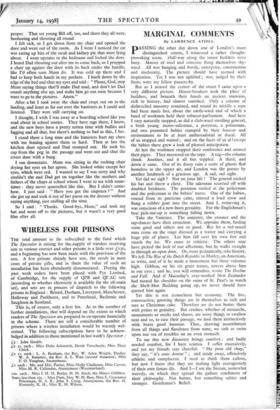MARGINAL COMMENTS
By LAWRENCE ATHILL PASSING the other day down one of London's more distinguished streets, I witnessed a rather thought- provoking scene. Half-way along the street builders were busy. Masses of steel and concrete flung themselves sky- ward. All was banging and bustle, enterprise, construction and modernity. The picture should have teemed with inspiration. Yet I was not uplifted ; nor, judged by their faces, were my fellow passers-by.
But as I neared the corner of the street I came upon a very different picture. House-breakers took the place of builders, and beneath their hands an ancient mansion, rich in history, had almost vanished. Only a column of dishevelled masonry remained, and round its middle a rope had been made fast, about the earth-ward end of which a band of workmen held their tobacco-parliament. And here I very naturally stopped, as did a club-ward strolling general, a brisk young motor-salesman, a postman, a policeman, and two prammed babies stamped by their hauteur and environment to be at least ambassadorial or ducal. All of us stopped and waited ; and on the faces of us al 1 except the babies there grew a look of pleased anticipation.
At last the workmen stopped their conference and stowed their pipes. They mustered on the rope. A tug—the column shook. Another, and it all but toppled. A third, and down it came. Out of its dusty ruin a score of ghosts fled homeless to the upper air, and London was the poorer by another landmark of a gracious age. A sad, sad sight.
Yet did we sigh ? Not on your life ! The general cocked his hat and threw a chest. The salesman scurried off with doubled briskness. The postman smiled at the policeman and the policeman at the babies' nurse. One of the babies, roused from its patrician calm, uttered a loud crow and flung a rubber goat into the street. And I, retrieving it, was conscious of a new-born geniality. For the Englishman's best pick-me-up is something falling down.
Take the Varieties. The conjurer, the crooner and the tap-dancer have their attraction. We appraise them, finding some good and others not so good. But let a red-nosed man come on the stage dressed as a waiter and carrying a huge pile of plates. Let him fall over his own feet and smash the lot. We cease to criticise. The others may have picked the lock of our affections, but he walks straight in through an open door. Or, more pedantically, take history.
We left The Rise of the Dutch Republic to Motley, an American, to write, and of it he made a monument but three volumes high. Gibbon, on his six great tomes, towers above him in our eyes ; and he, you will remember, wrote The Decline and Fall. And if Macaulay's over-worked New Zealander had turned his shoulder on the ruins of St. Paul's to watch the Shell-Mex Building going up, we never should have quoted him again.
Yet this is not iconoclasm but economy. The live, constructive, growing things are in themselves as rich and rare as Christmas cake. Therefore we do not butter them with praise or geniality. But crashes, whether of monarchs, monuments or stocks and shares, are sorry things to swallow neat and so, to ease their passage, we lard them instinctively with brave good humour. Thus, drawing nourishment from all things and flatulence from none, we sink or swim upon our sea of troubles on an even stomach.
To me this new discovery brings comfort ; and badly needed comfort, for I have sciatica. I suffer excessively, and yet my friends stay cheerful. " My poor old chap," they say, " it's anno domini " ; and stride away, offensively athletic and complacent. I used to think them callous, but now I know that they are making light courageously of their own future ills. And I—I am the biscuit, somewhat weevily, on which they spread the gallant condiment of their philosophy. Not butter, but something saltier and stronger. Gentleman's Relish.






































 Previous page
Previous page